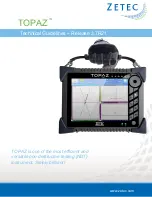
EL250RT
65
16 LED INDICATOR FUNCTIONS
The motherboard has six LED control signal lights, which can be activated with the dedicated 12-position dip switch on the
MES9012 card set to the ON position.
It is recommended that you set the dip switch to the OFF position after testing, to avoid seeing the signals and to reduce
the power consumption of the system.
POWER
Power-on LED
The POWER LED is the only one that remains on in normal operating
conditions, to confirm that the circuit board is properly powered.
ALM LED
Alarm LED
Normally off; when on, it indicates an alarm status. The alarm condition
will depend on the settings of the jumpers on the circuit board and the
response delay set on the SPEED trimmer, which can be adjusted from
a minimum of 50 mSec up to 500 mSec, increasing in a clockwise
direction.
MASK LED
Masking signal
When the MASK LED lights up, it indicates the presence of an
undesired modulated infrared signal. In the presence of an attempted
masking, there may be an
ANTI-MASK
signal on the terminal block.
Note: Under normal operating conditions, the LED should be off.
If it remains on or flashes, check the correct setting of the beam
selection jumpers on the various transmitters.
LOW SIG LED
Weak signal warning
(disqualification)
When the LOW SIG LED is on, it indicates the presence of THICK FOG.
In the presence of thick fog, before having a no-signal alarm condition,
the LOW SIG LED lights up and a
DISQUALIFICATION
signal may be
given on the terminal block.
Note: The barrier is excluded by inserting the LOW SIG jumper in
the ON position and intervention of the disqualification. Normal
function is restored as soon as the fog lifts.
HTR LED
LED confirmation of heating
system operation
The automatic heating system is electronically controlled to ensure a
temperature range of between 17°C and 22°C in all weather conditions.
The LED is normally off; when on, the heater is functioning.
SYNC LED
LED confirmation of
synchronization system operation
The SYNC LED flashes continuously to indicate the correct wiring and
synchronization of the transmitters and receivers.
















































